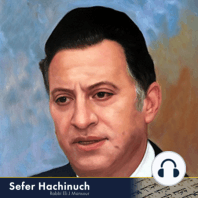20 min listen
Misva #229: Gezela (Robbery)
FromSefer Hachinuch
ratings:
Length:
20 minutes
Released:
Jul 1, 2022
Format:
Podcast episode
Description
The Torah in Parashat Kedoshim (19:13) commands, “Lo Tigzol” – “You shall not steal,” which the Sages understood as referring to robbery perpetrated openly. Whereas the term “Geneba” denotes stealing stealthily, by secretly seizing somebody else’s property (such as burglarizing a home in the middle of the night), “Gezela” refers to brazenly confronting a person and grabbing his possession, such as in the case of armed robbery. The Sefer Ha’hinuch writes that the reason behind this prohibition is clear and obvious, as theft is something which we all intuitively recognize as evil and a behavior which can lead to the complete breakdown of society. The Rambam writes that the prohibition of “Gezela” applies to stealing at least a “Shaveh Peruta” – the value of the smallest unit of Talmudic currency. Stealing less than this amount is still forbidden, though, by virtue of the principle of “Hasi Shiur,” which proscribes even violating partial amounts of Torah prohibitions. It is forbidden to steal from both Jews and gentiles, and even from idol-worshippers. The specific prohibition of “Lo Ta’ashok,” which forbids withholding money from those to whom one is indebted (such as for a loan or for work performed), also applies even to withholding payment from gentiles. Moreover, one is not allowed to steal even from dangerous evildoers whom Halacha permits to eliminate (such as those who cooperate with hostile governments against the Jewish community). One might have thought that since these people are allowed to be killed, their property should be treated as ownerless and allowed to be taken. In truth, however, their money may not be taken, because such people may have deserving inheritors, whose inheritance rights must be respected. Secondly, the Sefer Ha’hinuch writes, irrespective of the inheritors, the Torah does not want people to accustom themselves to stealing. Therefore, even if, in principle, the money of these evildoers is indeed permissible to be taken, this would not be allowed, for people might then get into the habit of taking money and possessions which do not belong to them. The Torah requires a thief who stole an object to return the object to its owner. However, the Sages enacted a provision called “Takanat Ha’shabin” (“provision for the penitent ones”), which allows a thief to pay the value of the object instead of returning it. This provision was enacted out of the concern that thieves might be deterred from repenting and making amends if they needed to return the actual object that they stole. If, for example, a thief stole a beam which he then used in constructing a building, he is not likely to repent for his crime if this necessitates dismantling the building in order to return the beam. The Sages therefore instituted that the thief can keep the beam, and simply pay the victim the value of the beam which he stole. If a thief stole something in an inhabited area, he cannot return it to the victim out in the open area, where it is not protected, without the victim’s consent. The victim has the right to insist that the object be returned in the town, where it is easier to guard. If the thief ignores the victim’s demand, and returns it out in the open, then he bears responsibility for the object if it is lost or damaged. If a person stole from a store and is too ashamed to repay what he stole, he may return to the store and overpay for a different piece of merchandise. If, for example, he stole an item worth $100, he can go back to the store and pay the shopkeeper $110 for a $10 product, and thereby fulfill his obligation. If a thief died before returning what he stole, his inheritors are required to pay the victim from the real estate which they received as part of the inheritance. If the thief had no real estate, then the inheritors are not required to repay the victim from the Metaltelin (moveable property) which they inherit. However, the Geonim enacted that the victim receives what he is owed from the inherited Met
Released:
Jul 1, 2022
Format:
Podcast episode
Titles in the series (100)
Misva #8: Leaving Over Meat of the Korban Pesach: Daily Sefer Hachinuch - Brought to you by itorah.com by Sefer Hachinuch
